Chapter 2
“Different…from that which is intended for the colored race”: Mexicans and Mexico in Jim Crow Mississippi, 1918-39
According to U.S. Census manuscript pages from 1930, about half of the Mississippi Delta’s adult Mexicanos were literate while half were not. Yet social historians cannot give up on their quest to discern the perspectives of historical actors that did not leave behind their own written records. Because the South has been mostly Protestant, Mexicanos attracted great attention from Catholic officials wherever they went in the region. Though priests brought deeply conservative and paternalistic attitudes into their work during this period, it is nonetheless possible to read “against the grain,” as some historians say, for clues about Mexicanos’ own world views, actions, and attitudes.
After reading Chapter 2 of Corazón de Dixie and reviewing this collection of documents from the Catholic Diocesan Archives in Mississippi, consider the following question: What did the Mexicanos who lived in or passed through Mississippi in the late 1920s want, and what were their strategies to get it?
Primary Sources
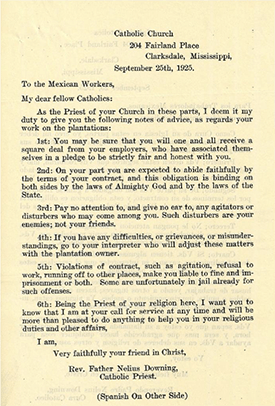
“To the Mexican Workers/Para los Trabajadores Mexicanos” from Rev. Father Nelius Downing, Catholic Priest, September 25, 1925, File 11, Folder “Downing” – “Downing, Rev. Nelius 1925,” ACDJ.
Father Nelius Downing, the Catholic priest in Clarksdale, Mississippi, wrote this flier and distributed it to Mexican workers in the Mississippi Delta during the 1925 picking season. The flier is certainly evidence of Downing’s attitudes towards the workers. But the mere fact that he felt compelled to write up such a document makes some strong suggestions about Mexicanos’ actions and attitudes as well.
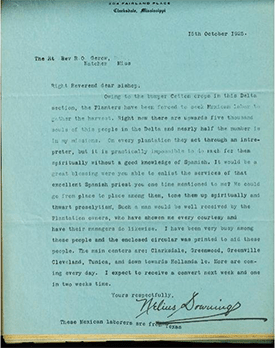
Nelius Downing to Rev. R.O. Gerow, October 15, 1925, File 11, Folder “Downing, Rev. Nelius 1925,” ACDJ.
Rev. Downing wrote this letter to his superior in the church hierarchy, the Bishop of Natchez Richard O. Gerow; he enclosed with the letter a copy of Document 2.1. The letter gives us a sense of Mexicanos’ interest in different strains of religious life in the Delta.
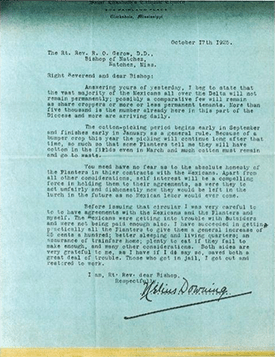
Downing to Gerow, October 17, 1925, File 11, Folder “Downing” – “Downing, Rev. Nelius 1925,” ACDJ.
Bishop Gerow has responded to Rev. Downing’s flier and letter (Documents 2.1 and 2.2); now Rev. Downing addresses the bishop’s concerns about both of them. As with Document 2.2, one can read between the lines of Downing’s attitudes to glean Mexicanos’ actions and attitudes, and the ways that they were wiling to use the limited power within their reach to improve their situation.
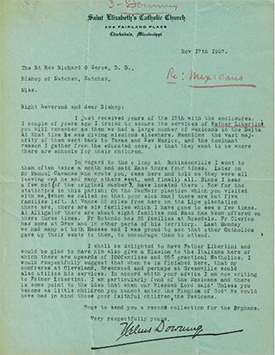
Downing to Gerow, November 17, 1927, file 11, folder “Downing” – “Downing, Rev. Nelius – 1927,” ACDJ
This letter implicitly and explicitly suggests some reasons for Mexicanos’ diminished presence in the Delta two years after their first large influx to the area.
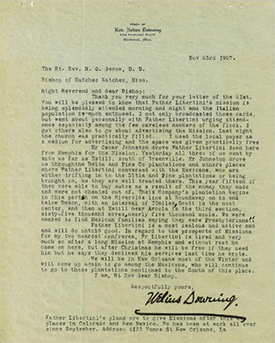
Rev. Nelius Downing to Bishop Gerow, November 23, 1927
Bishop Gerow has responded to the letter in Document 2.4, and now Rev. Downing is addressing his concerns. What can you learn about Mexicanos’ strategies and desires from the discussion of Oscar Johnston’s plantations? Further discussion on page 67 of Corazón de Dixie offers some context on Johnston and his company, Delta and Pine Land.
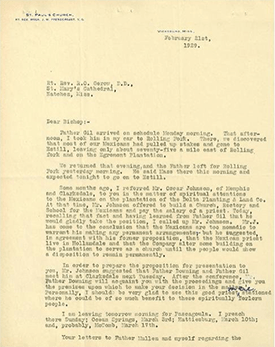
Rev. Prendergast to Bishop Gerow, February 21, 1929
Comparing this letter about Oscar Johnston’s plantation to one written two years beforehand (Document 2.5) can reveal Mexicanos’ constantly changing relationships with their employers in the Delta.
